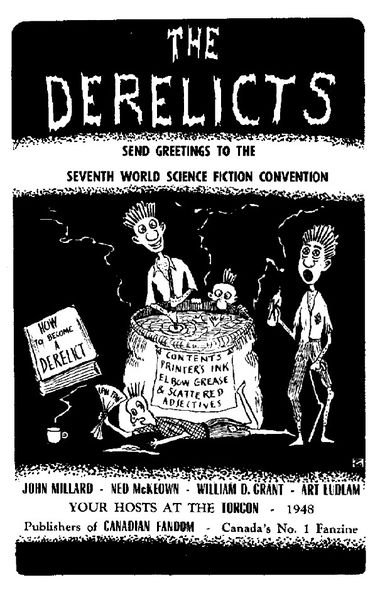Derelicts
Several Toronto fan groups have been called the Derelicts.
1947–1959[edit]
In the late 1940s, Ontario fandom was centered around the Toronto Science Fiction Society, aka the Toronto Derelicts (founded 1947), and the fanzine Canadian Fandom. Beak Taylor, John Millard, Bill Grant, Art Ludlam and Ned McKeown were prominent members. They put on Torcon. They took their nickname from the title of an essay by Doc Lowndes.
The club became moribund after their Worldcon, but in the early ’50s, a new group of fans (including Ron Kidder, Howard Lyons, Boyd Raeburn, Gerald Steward and Pat Patterson) joined.
Around 1953, a clique of insurgents, notably Ned McKeown, Grant, Lyons, Raeburn and Steward, started calling themselves the The Derelict Insurgents.
As typical insurgents, they indulged in lighthearted, nonserious behavior. Besides fanzines, the Insurgents were known for their liking of Beat poetry, jazz, leather jackets and fast cars. They were affiliated with the CSFA. However, they, too, faded away, and the club ended by 1959.
1966–1984[edit]
When OSFiC was founded in 1966, members adopted the nickname New Derelicts in tribute to the older group.
In the mid- to late 1970s, the Derelicts name covered a group including Patrick Hayden, Wayne MacDonald, Phil Paine, Alan Rosenthal, Janet Small, Bob Webber, Bob Wilson and Victoria Vayne. They were intense fanzine pubbers and inveterate walkers.
| From Fancyclopedia 2, ca. 1959 |
| Toronto fans, hosts to the 1948 TorCon and continuing up to the present time. Ned McKeown, Bill Grant, Howard Lyons, and Ger Steward were/are members. The Derelict Insurgents include Steward and Boyd Raeburn. |
| Group |
| This is a group page. Please extend it by adding information about when and where the group formed, its members, how long it was active, notable accomplishments, external links to the group's website, etc.
When there's a floreat (Fl.), this indicates the time or times for which we have found evidence that the group existed. This is probably not going to represent the group's full lifetime, so please update it if you can! |
